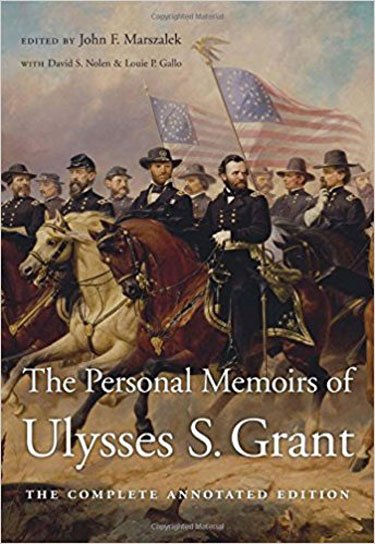T.J. Stiles reviews Harvard University Press’s new annotated edition of Grant’s Memoirs.
At this distance, it’s hard to see the appeal of McClellan’s self-regard and concocted grandeur, because he sounds like an ass. It’s easier to like Grant. In his memoirs, Grant expresses his “rigorous distaste†for “ceremony, theater and oratory†(in the words of the historian John Keegan) by describing two generals of the war with Mexico, in which he fought bravely as a young West Point graduate. He admires the unaffected Zachary Taylor, who “dressed himself entirely for comfort,†in civilian clothes. But Winfield Scott “always wore all the uniform . . . allowed by law,†Grant observes: “dress uniform, cocked hat, aiguillettes†— loops of braid at the shoulder — “saber, and spurs.†Grant respects Scott’s ability but not his language, noting he was “not averse to speaking of himself, often in the third person, and he could bestow praise upon the person he was talking about without the least embarrassment.â€
PhotoThat’s funny — almost Calvin Trillin funny — but we hear the bite. As modest and decent as Grant was, he appears to have clutched in his pocket a little squirming snake of resentment. After the Mexican War, he failed in the Army because of his secret shame, alcoholism, at a time when temperance was a major cultural force; he scrabbled hard in the years that followed, trapped in a desert of poverty. He returned to duty in the Civil War and won victory after victory, rising so high that Congress resorted to creating new ranks for him. His enemies retaliated by making his shame public, charging him with drunkenness. He felt the scorn of patricians like Henry Adams, who concluded he was “pre-intellectual . . . and would have seemed so even to the cave-dwellers.†Here and there, Grant shows how much it hurt. In cutting Scott, he goes beyond a mere lack of affectation into positive derision, mocking the pretensions of the refined society that mocked him.
“Perhaps never has a book so objective in form seemed so personal in every line,†Edmund Wilson observed, and I agree. But I disagree that Grant’s voice is “aloof and dispassionate.†Pain flickers behind the stolid pillars of the memoirs. He reflects his internal state off external surfaces, as with Taylor and Scott. Early on, he describes how as a boy he botched a negotiation for a horse — a telling anecdote, as financial failures agonized him — and the ensuing ridicule. “Boys enjoy the misery of their companions, at least village boys in that day did; and in later life I have found that all adults are not free from the peculiarity.â€
He armored himself with simplicity. Grant’s style is strikingly modern in its economy. It stood out in that age of clambering, winding prose, with shameless sentences like lines of thieves in a marketplace, grabbing everything in reach and stuffing it all into their sacks. Indeed, Grant adhered to Adams’s own instructions to the staff of the North American Review: “Strike out all superfluous words, and especially all needless adjectives.†Wilson observed, “Every word that Grant writes has its purpose, yet everything seems understated.â€
Authenticity is not perfect honesty, of course. Grant cannot always escape the impulse to put things in a favorable light, and he remembers his detractors. “The most confident critics are generally those who know the least about the matter criticized,†he writes. That defensive tone is uncharacteristic, though it’s revealing.
The Civil War rages for most of his book, and Grant proves an exemplary military narrator. He provides context clearly, even after he becomes general in chief, operating on a national scale. He makes his strategy sound like common sense, not genius. We feel his strength of will, from the dreadful first day of Shiloh to the great risk of his Vicksburg operation and beyond. He knew, too, how to shape the reader’s experience. He opens Chapter 50 with these two sentences: “Soon after midnight, May 3d–4th, the Army of the Potomac moved out from its position north of the Rapidan, to start upon that memorable campaign, destined to result in the capture of the Confederate capital and the army defending it. This was not to be accomplished, however, without as desperate fighting as the world has ever witnessed; not to be consummated in a day, a week, a month or a single season.†He delivers so much dread and anticipation with those words, at just the right place.
Grant’s preface alludes to the fact that he wrote as he was dying cruelly of throat cancer, after a swindler had bankrupted and humiliated him. Remarkably, that’s irrelevant to the text, which any writer could count as a triumph.






Please Leave a Comment!